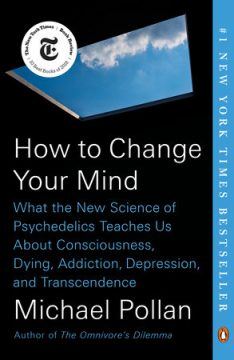Audrey Farley at Marginalia Review:
 Under the influence of mind-altering drugs, individuals cannot distinguish between subjective experience and external objects. Even after the ego returns and normal cognitive processes resume, people have an unshakable belief in what they encountered in their altered cognitive state. This isn’t to say that psychedelic-users are deluded. To the contrary, Pollan suggests, they may have been granted access to hidden truths. Pollan invokes Aldous Huxley’s notion of a “mind at large” and philosopher Henri Bergson’s theory of distributed consciousness to explain this phenomenon. Both thinkers purported that the human brain does not singularly produce consciousness; rather the brain enables humans to “tune in” to certain frequencies like someone turning the dial of a radio. For Huxley and Pollan, psychedelics increase the number of stations available.
Under the influence of mind-altering drugs, individuals cannot distinguish between subjective experience and external objects. Even after the ego returns and normal cognitive processes resume, people have an unshakable belief in what they encountered in their altered cognitive state. This isn’t to say that psychedelic-users are deluded. To the contrary, Pollan suggests, they may have been granted access to hidden truths. Pollan invokes Aldous Huxley’s notion of a “mind at large” and philosopher Henri Bergson’s theory of distributed consciousness to explain this phenomenon. Both thinkers purported that the human brain does not singularly produce consciousness; rather the brain enables humans to “tune in” to certain frequencies like someone turning the dial of a radio. For Huxley and Pollan, psychedelics increase the number of stations available.
This philosophy raises important questions that Pollan doesn’t answer. For instance: do schizophrenics and others who experience hallucinations have greater access to hidden truths? Is it possible that these individuals are not “mad,” but instead clued in to facets of the universe not readily apparent to “healthy normals?”
more here.
